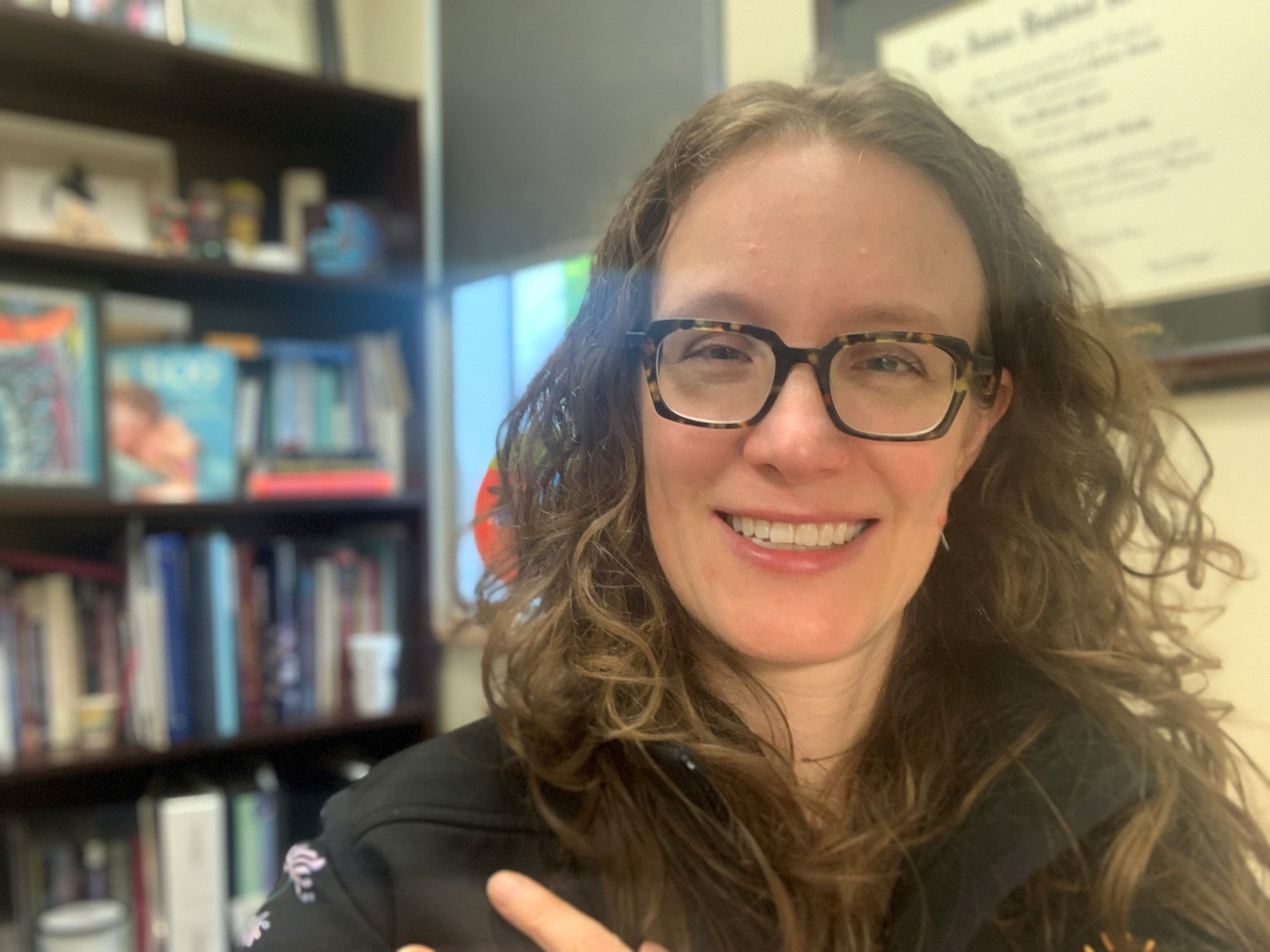
When Dr. Eva Moore first applied to a pediatric residency in Seattle in 2004, she made a conscious decision not to bring up a common topic – home life.
“In my mind, I had this very clear idea of ‘I’m going into this interview and I’m not going to talk about my wife,’” says Moore, who goes by the pronouns she/they. “It’s so easy to not fit it in or not talk about it.”
Now, 18 years later, Moore is an adolescent medicine pediatrician at BC Children’s Hospital and feels the polar opposite.
“It’s important for me and us, as queer people, to be ourselves and bring ourselves into our work and not separate ourselves from the work we do,” she says. “I think it is important to be yourself. What I found is that when I’m comfortable, people take that lead.”
So what led Moore from staying silent to speaking up? To help mark Pride Month, she shares the journey with us.
Moore grew up in Seattle with one sister and their parents, who were both doctors. Both grandparents on their father’s side were also doctors. She didn’t initially want to go into medicine because, like most young people, she wanted to explore the options.
She started at Bryn Mawr College in Pennsylvania as a chemistry major. She came out within three days of being in this new environment.
Moore’s extended family was Catholic so she was discouraged from talking about being queer, even though Moore’s parents knew and accepted she was out. This had a resounding impact throughout Moore’s life.
Moore finished college and worked for a couple of years in Philadelphia as an HIV and sexual-health hotline counsellor. She also guided teenagers to teach sexual health in various communities around Philadelphia.
“I was like ‘This is what I want to do’ but I wanted to get more education, have more experience and be a little bit more of a leader in this kind of field so I entered medicine with this vision.”
When she started medical school, she had to come out, all over again.
“I kind of went back to that teaching that my parents gave me of ‘Well, don’t share that.’”
There were times when Moore didn’t feel like coming out and she decided not to talk about it very much, but she found solace in connecting with others who were queer.
“When I started medical school in 2000, there were six of us,” she says. “We had our LGBT Alliance group. There were none in the year ahead of me and one in the year before so I was glad to have these six people.”
Moore finished a medical degree, residency in pediatrics, and an adolescent medicine fellowship, along with a master’s degree in public health.
 Moore married a woman named Hope, while still living in the U.S.
Moore married a woman named Hope, while still living in the U.S.
“When I got married, it wasn’t legal in the state that I was in and so I had to fly to get married and a licence in a state that I’d never lived in and never planned to live in. It’s such a subtle thing, but a huge thing for me for some reason… to not be recognized was hard.”
She and Hope have two children, aged six and 11.
“When I had my first child, because my marriage wasn’t legally recognized, Hope had to adopt him and we had to go through this adoption process and get her on the birth certificate so that legally, if something happened and I wasn’t available, she could be a legal parent. We moved to B.C. and they were like ‘You don’t have to do that here.’ That’s such a huge relief.”
She moved to Vancouver and began working at BC Children’s in 2012.
Moore is now completely out with those she works with on a regular basis. She’s glad to have made it to a space where she feels comfortable.
 “I’m not concerned about sharing that with my colleagues at all. I think I’m still trying to navigate those social conversations with people that you don’t know at work… I’ll talk about my kids very freely, but there’s still that kind of ‘OK, do I talk about my partner? Do I come out to them?’ I’m trying to get to the point where I’m not thinking about it so much.”
“I’m not concerned about sharing that with my colleagues at all. I think I’m still trying to navigate those social conversations with people that you don’t know at work… I’ll talk about my kids very freely, but there’s still that kind of ‘OK, do I talk about my partner? Do I come out to them?’ I’m trying to get to the point where I’m not thinking about it so much.”
She also feels a responsibility to speak up about being queer to support the next generation.
“I have the luxury of coming out without losing my job. Some people still lose their jobs because they come out.”
Moore has also realized talking about experiences can actually help patients. At one point at BC Children’s, she had a long-term patient with two moms and when the girl was 19, Moore finally told her she was queer and had children.
“She was like, ‘Why didn’t you tell me this before!’”
It was an inspiration for Moore.
 “I’m trying to figure out how to come out to patients and families when it’s relevant, and maybe not when it’s relevant, too. I’m not trying to promote it, necessarily, because I think our patients are going through their own journey and don’t need to hear about the ins-and-outs of my life, but in the context that they may not have had the opportunity to talk to someone who is queer. Maybe they are struggling with their own differences and feel alone, whatever that difference may be.
“I’m trying to figure out how to come out to patients and families when it’s relevant, and maybe not when it’s relevant, too. I’m not trying to promote it, necessarily, because I think our patients are going through their own journey and don’t need to hear about the ins-and-outs of my life, but in the context that they may not have had the opportunity to talk to someone who is queer. Maybe they are struggling with their own differences and feel alone, whatever that difference may be.
“It’s important, in that regard, for us to be part of the diversity of our communities. If there’s something that I can do to help people along, then it’s amazing to be part of that.”
- Celebrate Pride Month with PHSA - check out the resources at the bottom
- OUTReach - connecting mentors and students at UBC
- Qmunity - works to improve queer, trans, and Two-Spirit lives
- Unya - centre of Indigenous youth excellence
- Pflag - founded by parents who wished to help themselves and their family members understand and accept their LGBTQ2S children
